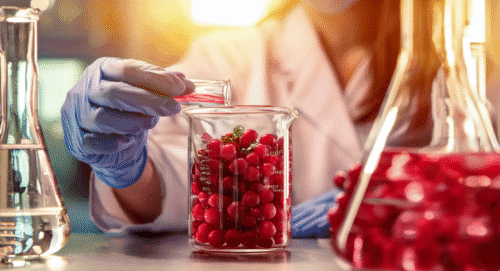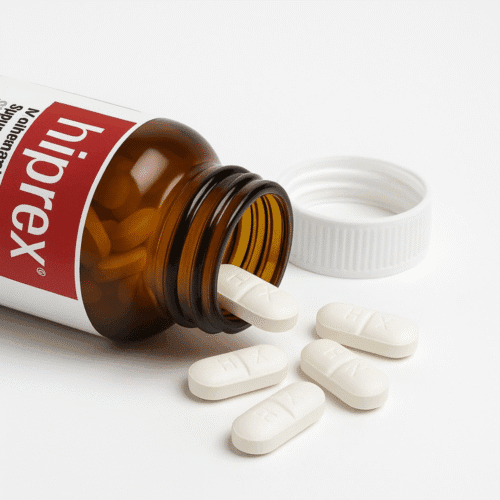Urinary tract infection (UTI) occurs when disruptive bacteria or fungi in the urinary tract overgrow and cause symptoms.
The infection causes inflammation of the delicate mucosal lining of the urethra and bladder. Cystitis is the name of the infection when it travels upwards to the bladder, but the terms ‘urinary tract infection’ and ‘cystitis’ are largely used interchangeably.
Anatomy: the urethra, bladder and kidneys
- The urethra is the outermost part of the urinary tract, a tube where urine flows out of the body.
- The bladder, which stores urine, is connected to your two kidneys by long, skinny, spaghetti-sized tubes called ureters.
- The kidneys filter blood, produce urea (the yellow colour and distinct urine odour), and then water it down to make urine.
- The urine fills up the bladder, which, at a certain point of fullness, triggers sensors in the bladder wall that produce the feeling of needing to urinate.
- When you’re ready, the pelvic floor muscle relaxes, releasing its grip on the urethra, and urination occurs as urine exits the urethra.
The urinary tract, particularly the urethra, can be prone to infections because it’s so close to the outside world, including the anus. Women and people with vaginas are 50 times more likely than men and people with penises to get UTIs.
UTIs can resolve without treatment, but they are pretty uncomfortable and quick, effective treatment is preferable. Untreated UTIs can escalate quickly, ultimately potentially causing damage and scarring.
Symptoms of urinary tract infection
- Burning and stinging when urinating
- Urinary urgency
- Urinary frequency
- Blood in urine (pink urine)
- Pus in urine (cloudy urine)
- Urethral pain
- Bladder pain
- Kidney pain
- Pelvic pressure and pain
- Inflammation, redness, swollen labia, vulva or urethral opening
How did I get a UTI?
While you can ‘catch’ UTI-causing bacteria, typically, UTIs develop due to susceptibility in your system – immune system, weak microbiome, ill health – or incoming energy sources or bacteria.1
Sex that involves a finger, toy or penis going from the anus to the vagina can provide UTI-causing bacteria to be in or near the vagina or urethra and cause a UTI.2 Never, ever let someone double dip anus to vagina without washing thoroughly between.3 See good vaginal health for more information on how to stay clean while you are getting dirty.
Biofilm in recurrent UTI
A biofilm is a sort of matrix produced by microbes that protects them from treatments as a raincoat protects us from rain. Biofilms are everywhere, and many biofilms are healthy, but when it comes to chronic UTI, biofilms are not your friend.4,5
Biofilms mean that the deeper well of bacteria hiding in your urinary tract are not touched by treatments, but only the planktonic (free-floating) bacteria.
Treatment and prevention of UTIs after sex
- Avoid semen in the vagina – semen is high in fructose, an energy source for UTI-causing bacteria.
- Use a probiotic vaginally after sex as a prophylactic (preventative) – remember, a UTI typically takes 48 hours to appear after sex due to the incubation period, so use the probiotic right after and use it for 1-2 days if needed. But, one probiotic can be enough.
- Use the Oral UTI Herbal Blends for 1-2 days as per the acute dosing instructions on the label to treat or prevent a UTI after sex.
- Methenamine (Hiprex) can be used short-term.
- If you have recurrent UTIs, see a My Vagina specialist practitioner for 100% holistic, effective care to interrupt the cycle by identifying and treating the root cause of your infections.
- If symptoms are escalating – pain, fever, kidney pain or blood in your urine – please visit your local emergency room or doctor.
Non-drug treatments for urinary tract infections
Learn more about Treating a UTI at home, where we detail your at-home options for acute and chronic infections, ranging from reflexology to herbal medicines.
If you want the highlight list of UTI treatment options, this is our top to bottom non-drug options:
- Oral UTI Herbal Blends (recommended)
- Hiprex (recommended as backup)
- Reflexology (recommended)
- D-Mannose (recommended as preventative if chronic)
- High-dose cranberry 6
- Urinary alkalisers
Drug/antibiotic treatments for UTI
Treatment for UTIs will depend on your doctor’s latest antibiotic recommendations and the bacteria present.7
Current antibiotic regimes may not be sufficient to clear a UTI completely due to antibiotic resistance and chronic/embedded UTI. If you have recurrent treatment-resistant UTIs, schedule a consultation with a My Vagina specialist practitioner for effective non-drug treatments to stop the recurrence.
Getting support for chronic UTI
My Vagina’s clinical naturopaths work with people with chronic UTI daily and can help you resolve chronic urinary tract infections.
Our experienced practitioners use non-drug non-resistance-forming strategies that can work concurrently with antibiotics as needed, using an integrative, holistic framework. We aim to reduce antibiotic use as much as possible with effective solutions for urinary tract infections.
Can cranberry treat bacterial vaginosis?
Discover how high-PAC cranberry supports vaginal wellness by reducing UTI-related BV flare-ups — not by curing BV, but by breaking the cycle.
Cranberry and UTIs: what actually works
Cranberry has a long history of use in UTI, but not all supplements are created equal. Learn how cranberry works and how to choose a great product.
Hiprex is Pharmacy Only, what now?
On October 1, 2025, Hiprex, a trusted UTI preventative, became restricted in Australia. Discover alternatives and expert insights for effective care.
More information on UTIs
Who gets UTIs?
- Anyone can get a urinary tract infection
- Women who get UTIs may have had many UTIs as a girl
- You get more UTIs if you are a sexually active 20-40-year-old, or are postmenopausal
- If you have had one UTI, you’re more likely to get another one
- 15 per cent of all women have UTI issues at least once a year
- 2-4 per cent of women have high levels of bacteria in their urine, which might indicate an unrecognised UTI
- 30 per cent will have a UTI at some point in their life
- UTIs occur most often in babies, during pregnancy, and in the elderly
- People with a catheter, diabetes, multiple sclerosis, HIV/AIDS or ongoing urological issues are also more prone to UTIs
Does it matter which bacteria is causing a UTI?
Yes and no. An acute UTI may show distinct bacteria in the urine, whereas a chronic UTI may show very few pathogens or normal-looking microflora (‘mixed flora’).
Research shows that, when comprehensive urinary microbiome testing is used to establish flora in the urinary tract, true microbiome readings can be established.8 Read more about how dipsticks and cultures are useless at diagnosing UTIs in many cases.
Different bacteria are susceptible to different treatments. So many bacteria can cause a urinary tract infection, so while there are some very common offenders, it could be a vast array of microbes causing your problems, or the specific combination present.
Proper testing should be carried out, for the right treatment applied quickly. The antibiotics prescribed are bacteria-dependent, and susceptibility testing should be carried out.9,10
Common UTI-causing bacteria
- Citrobacter freundii
- Enterobacter aerogenes
- Enterobacter cloacae
- Enterococcus faecalis
- Escherichia coli (most UTIs)- see E. coli biofilms for more information on recurrent UTIs
- Klebsiella pneumoniae
- Proteus mirabilis
- Proteus vulgaris
- Pseudomonas aeruginosa
- Salmonella typhi
- Serratia marcescens
- Methicillin-resistant Staphylococcus aureus (MRSA)
- Streptococcus agalactiae (Group B Strep)
References
- 1.Malone-Lee J. Urinary infections are complex and hard to treat. BMJ. Published online December 18, 2017:j5766. doi:10.1136/bmj.j5766
- 2.Sansone S, Ramos Y, Segal S, Asfaw TS, Morales DK. Uncovering Surface Penetration by Enterococci From Urinary Tract Infection Patients. UROGC. Published online March 2024:320-329. doi:10.1097/spv.0000000000001476
- 3.Daher A, Albaini O, Siff L, Farah S, Jallad K. Intimate hygiene practices and reproductive tract infections: A systematic review. gocm. Published online September 2022:129-135. doi:10.1016/j.gocm.2022.06.001
- 4.Soto SM. Importance of Biofilms in Urinary Tract Infections: New Therapeutic Approaches. Advances in Biology. Published online July 2, 2014:1-13. doi:10.1155/2014/543974
- 5.Yousefi M, Pourmand M, Fallah F, Hashemi A, Mashhadi R, Nazari-Alam A. Characterization of Staphylococcus aureus Biofilm Formation in Urinary Tract Infection. Iran J Public Health. 2016;45(4):485-493. https://www.ncbi.nlm.nih.gov/pubmed/27252918
- 6.Micali S, Isgro G, Bianchi G, Miceli N, Calapai G, Navarra M. Cranberry and Recurrent Cystitis: More than Marketing? Critical Reviews in Food Science and Nutrition. Published online January 2014:1063-1075. doi:10.1080/10408398.2011.625574
- 7.Zalmanovici Trestioreanu A, Green H, Paul M, Yaphe J, Leibovici L. Antimicrobial agents for treating uncomplicated urinary tract infection in women. Cochrane Database of Systematic Reviews. Published online October 6, 2010. doi:10.1002/14651858.cd007182.pub2
- 8.Chu CM, Lowder JL. Diagnosis and treatment of urinary tract infections across age groups. American Journal of Obstetrics and Gynecology. Published online July 2018:40-51. doi:10.1016/j.ajog.2017.12.231
- 9.Schmiemann G, Kniehl E, Gebhardt K, Matejczyk MM, Hummers-Pradier E. The Diagnosis of Urinary Tract Infection. Deutsches Ärzteblatt international. Published online May 28, 2010. doi:10.3238/arztebl.2010.0361
- 10.Davenport M, Mach KE, Shortliffe LMD, Banaei N, Wang TH, Liao JC. New and developing diagnostic technologies for urinary tract infections. Nat Rev Urol. Published online March 1, 2017:296-310. doi:10.1038/nrurol.2017.20









